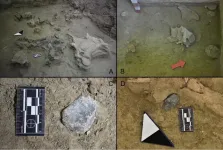(Press-News.org) Surgery involving sentinel lymph node biopsy for middle-aged women with estrogen receptor-positive (ER+) breast cancer may do more harm than good, according to a new study led by University of Pittsburgh and UPMC Hillman Cancer Center researchers. The team used a novel artificial intelligence pipeline developed by Realyze Intelligence, a UPMC Enterprises portfolio company, to analyze electronic health records.
The findings, published today in JCO Clinical Cancer Informatics, suggest that clinical guidelines for de-escalating surgery in women aged over 70 years with early-stage ER+ breast cancer may be safely extended to post-menopausal patients 55 or older.
“This research informs the overall goal of moving away from a one-size-fits-all approach for treating breast cancer,” said lead author Neil Carleton, graduate student in Pitt’s Medical Scientist Training Program. “Instead, our focus is tailoring care so that treatment is at the right level for each patient, which includes doing less surgery when it’s unlikely to have a benefit.”
Sentinel lymph node biopsy, which involves surgically removing one or more lymph nodes that drain from a patient’s primary tumor, allows oncologists to detect whether the cancer has spread. This procedure is usually standard-of-care for patients with breast cancer, but there are risks, including lymphedema, or buildup of lymphatic fluid, which causes swelling, discomfort and mobility issues.
“Even though there is a relatively low risk of lymphedema after sentinel lymph node biopsy, this condition can have devastating effects on a person’s quality of life,” said senior author Emilia Diego, M.D., associate professor of surgery and chief of the Breast Surgery Division at Pitt and co-director of the Breast Cancer Program at Hillman Cancer Center and UPMC Magee-Womens Hospital. “As medical professionals, we have a duty to continuously seek ways to improve care while minimizing untoward outcomes of treatment. This study points to the low likelihood of additional information from a sentinel node biopsy, suggesting it may not be necessary for care in every breast cancer case.”
Women aged over 70 who are diagnosed with early-stage ER+ breast cancer have very low rates of metastasis, according to previous research. For these patients, overtreatment can have little benefit on survival but greatly decrease quality of life. These findings have led to efforts aimed at de-escalating treatment for this patient population, and in 2016, the Society of Surgical Oncology released a recommendation as part of its Choosing Wisely initiative that advocates against routine sentinel lymph node biopsy for ER+ breast cancer patients aged over 70 with tumors less than 2cm in diameter.
To examine whether that guideline could be extended into younger patients, the researchers used Realyze Intelligence’s technology to scour electronic health records of 925 patients aged 55 or older who were diagnosed with ER+ breast cancer between 2015 and 2017 and had sentinel lymph node biopsy as part of their care. Looking across an average follow-up period of 5.5 years, they compared rates of lymph node-positivity, which indicates that the cancer has spread, with rates of lymphedema.
“There’s a lot of valuable data in the electronic health care record that is hidden within unstructured physician notes,” said Carleton. “The power of Realyze is that it goes into these notes and pulls out information by looking at the language itself and, importantly, the context of that language. So, it allowed us to look not only for records of lymphedema but also where that lymphedema was located. That’s important because arm and breast lymphedema are likely to be related to lymph node biopsy, whereas leg lymphedema is likely due to other conditions.”
The natural language understanding (NLU) pipeline filtered hundreds of thousands of clinical notes, including those made by patients’ oncologists and other health providers.
In comparison to manually verified records, the NLU pipeline was 95% accurate in identifying cases of breast or arm lymphedema, indicating the tool was effective at extracting this valuable information, which isn’t routinely documented in cancer records.
Just 13% of patients aged 55-69 and 7% of those aged 70 or older had positive sentinel lymph node biopsies, suggesting low risk of metastasis in this population. For patients who did have lymph node involvement, the vast majority had just 1-3 positive nodes — a result that does not impact treatment decisions without additional genetic data. Only one patient in each age group had more than three positive lymph nodes.
Notably, lymphedema rates were higher than rates of lymph node involvement.
“In older patients with small tumors, rates of lymph node positivity are very low, suggesting that sentinel lymph node biopsy does not provide additional information to guide therapy,” said Carleton. “Given the risk of lymphedema and low nodal involvement, the potential harms of this procedure may outweigh the benefits. Our study, in addition to recently published clinical trial data, suggests that recommendations aimed at de-escalating surgery could be moved to age 55 for women with small, ER+ disease.”
Other authors on the study were Gilan Saadawi M.D., Ph.D., of Realyze Intelligence; and Priscilla McAuliffe, M.D. Ph.D., Atilla Soran, M.D., M.P.H., Steffi Oesterreich Ph.D., and Adrian Lee Ph.D., all of Pitt and UPMC.
This research was supported by the National Cancer Institute (5F30CA264963-02), the Breast Cancer Research Foundation and Susan G. Komen.
END
Study suggests it may be safe to de-escalate surgery in middle-aged breast cancer patients
2024-05-22
ELSE PRESS RELEASES FROM THIS DATE:
Eating more ultra-processed foods tied to cognitive decline, stroke
2024-05-22
MINNEAPOLIS – People who eat more ultra-processed foods like soft drinks, chips and cookies may have a higher risk of having memory and thinking problems and having a stroke than those who eat fewer processed foods, according to a new study published in the May 22, 2024, online issue of Neurology®, the medical journal of the American Academy of Neurology. The study does not prove that eating ultra-processed foods causes memory and thinking problems and stroke. It only shows an association.
Ultra-processed foods are high in added sugar, fat and salt, and low in protein and fiber. They include soft drinks, salty and sugary snacks, ...
What factors predict when older adults will stop driving?
2024-05-22
MINNEAPOLIS – What factors lead older adults to stop driving? A new study followed older adults who had no memory or thinking problems to examine this question. The study is published in the May 22, 2024, online issue of Neurology®, the medical journal of the American Academy of Neurology.
“Alzheimer’s disease develops over a long time—people may have a 10- to 15-year period where they have no symptoms, but the disease process is developing in the brain,” said study author Ganesh M. Babulal, PhD, OTD, of Washington University School of Medicine in St. ...
Subtle cognitive decline precedes end to driving for older adults
2024-05-22
One of the thorniest decisions facing older adults is when to give up their keys and stop driving. A new study by researchers at Washington University School of Medicine in St. Louis could provide guidance in helping seniors plan ahead. The researchers found that impaired cognitive function foreshadows the decision for many seniors to stop driving — more so than age or molecular signs of Alzheimer’s disease. Even very slight cognitive changes are a sign that retirement from driving is imminent. Further, women are more likely to stop driving than ...
Irina Petrache, MD, ATSF, commences term as President of the American Thoracic Society
2024-05-22
May 22, 2024 – Irina Petrache, MD, ATSF, today added president of the American Thoracic Society to her list of accomplishments. The announcement came on the heels of the Plenary Session at the ATS 2024 International Conference. The slate of officers to serve on the Society’s Executive Committee for the 2024-2025 term consists of the following:
Irina Petrache, MD, ATSF, Incoming President
Dr. Petrache is professor of medicine at National Jewish Health and at the University of Colorado. She also serves as chief of Pulmonary, Critical Care and Sleep Medicine, associate ...
Beach erosion will make Southern California coastal living five times more expensive by 2050, USC study predicts
2024-05-22
Contact: Nina Raffio, raffio@usc.edu or (213) 442-8464
Rising sea levels and urban development are accelerating coastal erosion at an alarming rate in Southern California with significant ripple effects on the region’s economy, a USC study reveals.
The study, published in Communications Earth & Environment, predicts that Southern California’s coastal living costs will surge fivefold by 2050 as a direct result of beach erosion. This erosion will require more frequent and costly beach nourishment projects to maintain the state’s treasured shorelines, consequently driving up the cost of living along the coast.
“Our ...
Mount Sinai experts to present new research on long COVID, lung cancer, asthma, sleep apnea, and more at ATS 2024 International Conference
2024-05-22
World renowned pulmonologists and experts in respiratory medicine from the Mount Sinai Health System in New York City will present new research at the American Thoracic Society (ATS) 2024 International Conference in San Diego from May 17–May 22. Please let me know if you would like to coordinate an interview about their work. Mount Sinai doctors and researchers are also available to comment on breaking news and trending topics.
Sessions and Symposiums
(All abstracts listed below are under embargo until the scheduled start ...
Ancient people hunted extinct elephants at Tagua Tagua Lake in Chile 12,000 years ago
2024-05-22
Thousands of years ago, early hunter-gatherers returned regularly to Tagua Tagua Lake in Chile to hunt ancient elephants and take advantage of other local resources, according to a study published May 22, 2024 in the open-access journal PLOS ONE by Rafael Labarca of the Pontifical Catholic University of Chile and colleagues.
Multiple archaeological sites are known from the region of Tagua Tagua Lake in central Chile, representing some of the earliest known human settlements in the Americas. In this study, Labarca and colleagues report ...
Twitter may be overlooking misinformation "superspreaders" - political pundits, low-credibility media outlets, and influencers who use more toxic language than the typical misinformation spreader
2024-05-22
Twitter may be overlooking misinformation "superspreaders" - political pundits, low-credibility media outlets, and influencers who use more toxic language than the typical misinformation spreader
###
Article URL: https://journals.plos.org/plosone/article?id=10.1371/journal.pone.0302201
Article Title: Identifying and characterizing superspreaders of low-credibility content on Twitter
Author Countries: USA, UK
Funding: This work was supported by the John S. and James L. Knight Foundation, Craig Newmark Philanthropies, and the National Science Foundation (grant ACI-1548562). The funders had no role in study design, data ...
Escaped GMO canola plants persist long-term, but may be losing their extra genes
2024-05-22
Populations of canola plants genetically engineered to be resistant to herbicides can survive outside of farms, but may be gradually losing their engineered genes, reports a new study led by Cynthia Sagers of Arizona State University, US, published May 22 in the open-access journal PLOS ONE.
The hypothesis has been put forward that if any genetically engineered crop plants escape farm fields, they will be short-lived. This would make them unlikely to take over wild areas or spread their inserted genes, called transgenes, to wild populations ...
Ancient Mycenaean armor tested by Marines and pronounced suitable for extended combat
2024-05-22
A famous Mycenaean suit of armor was not just ceremonial, but suitable for extended combat, according to a study published May 22, 2024 in the open-access journal PLOS ONE by Andreas Flouris of the University of Thessaly, Greece and colleagues.
One of the oldest known suits of European armor is a 3500-year-old suit found near the village of Dendra, a few kilometers away from ancient Mycenae. Since its discovery in 1960, it has been unclear if this was a ceremonial suit or if it was suitable for battle. This question has important implications for understanding ...






